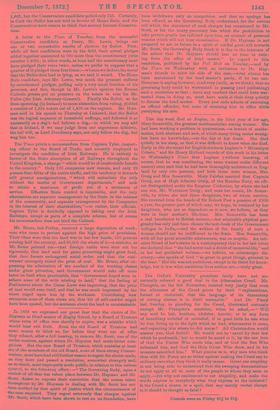In 1869 we expressed our great fear that the choice
of Dr. Hayman as Head master of Rugby School, by a Board of Trustees whose term of office was shortly to expire, was a mistake which would bear evil fruit. Even the old Board of Trustees had some reason to think so, for before they went out of office they refused, after a full hearing, to remove Mr. Scott, one of the under-masters, against whom Dr. Hayman had made bitter com- plaints. But the new Board of Trustees, which contains at least eix of the members of the old Board, some of them strong Conser- vatives, must have had still further reason to regret the choice made, as they have just passed a resolution, somewhat strangely and, as we think, most improperly made public, in relation to this serious quarrel, to the following effect :—" The Governing Body, upon a -review of all that has taken place between Dr. Hayman and Mr. Scott, desire to express their conviction that the course taken throughout by Dr. Hayman in dealing with Mr. Scott has not been marked by that spirit of justice which the circumstances of the case required. They regret extremely that charges against Mr. Scott, which have been shown to rest on no foundation, have
been withdrawn only on compulsion, and that no apology has been offered, as the Governing Body understand, for the serious evil which the statement of such charges has occasioned to Mr. Scott, or for the heavy pecuniary loss which the prohibition to take private pupils has inflicted upon him, on account of personal reasons which will not bear examination. If Dr. Hayman is not prepared to act in future in a spirit of cordial good-will towards Mr. Scott, the Governing Body think it is due to the interests of the school that Dr. Hayman should lose no time in retir- ing from ,the office of head master." In regard to this resolution, published by the Pall Mall on Tuesday,—and by the Times on Wednesday with an invitation to Dr. Hay- man's friends to state his aide of the case,—total silence has been maintained by the head master's party, if he has one. Everyone is saying however, (and very justly, as we think), that-no governing body could be warranted in passing (and publishing) such a resolution as that ; since any conduct that could have war- ranted them in doing so, must have made it their duty quietly to dismiss the head master. Every just code admits of executing an official offender, but none of retaining him in office while paralysing his arm.


































 Previous page
Previous page